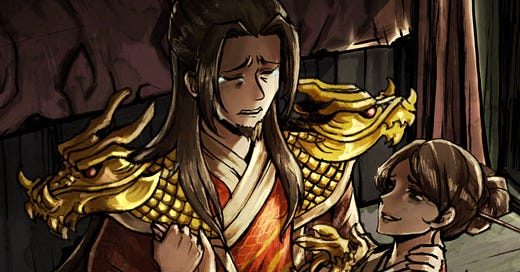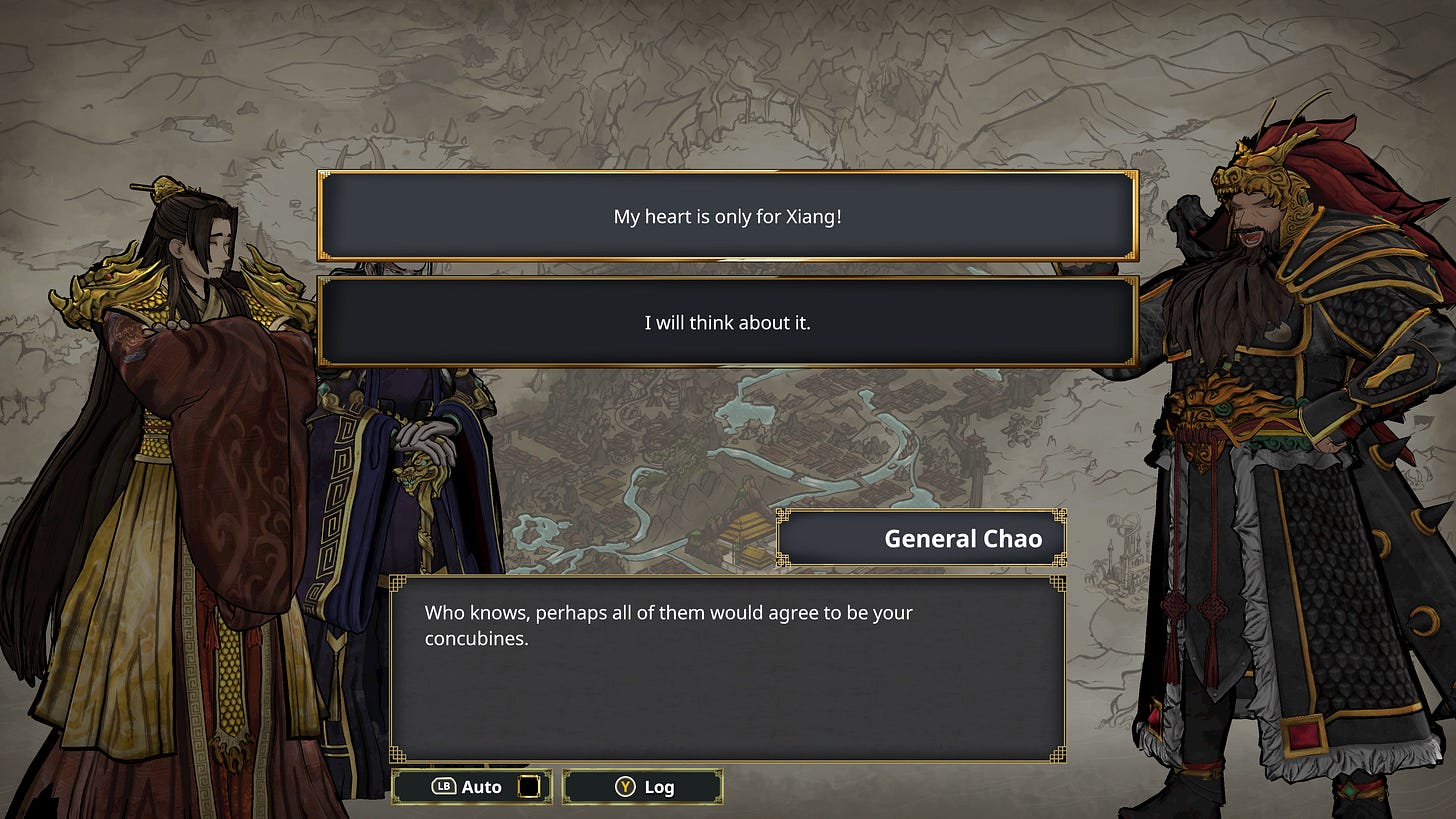My Lovely Empress isn't for the faint of heart, and is all the better for it
What happens when Yes, Your Grace, Cult of the Lamb and Katawa Shoujo walk into a mythological bar?
Review: My Lovely Empress
Developed by GameChanger Studio and Neon Doctrine, and published by Neon Doctrine
Rating: ★★★★★★★★☆☆
The genre of empire management sims has neither ever been my personal favourite nor my go-to in the quest to try out something different. As far as strategy games go, real-time strategy titles always take up far more of my attention anyway. Imagine my surprise then at not only enjoying My Lovely Empress, but being absolutely gripped by it.
As per the promotional materials, the game is “an empire management sim inspired by Asian mythology. As the Emperor of the Crimson Empire, you will build relations with neighbouring rulers, balance internal factions, and ensure the prosperity of your people, all before you reap their souls to resurrect your beloved empress.” If this sounds gnarly, you should probably check out the trailer before we go any further.
All caught up? Excellent, let’s proceed. The third in the My Lovely series — preceded by alchemist simulator My Lovely Daughter and alchemist simulator/dating sim My Lovely Wife — appears to be the most ambitious of the lot, pulling in elements of empire sims, resource management, dating sims and even a spot of creature collection, as part of a turn-based structure.
The premise is slightly convoluted, but fascinating nonetheless: You essay the role of Emperor Hong, the ruler of the Crimson Empire, who has recently lost his empress to a tragic illness. And this leaves you torn between grief and duty. As a monarch, you must balance the needs of your subjects — commoners, traders, nobles and soldiers — and engage in diplomacy with neighbouring kingdoms. As a widower, you must try and cope with your grief. In young Emperor Hong’s case, this entails summoning the Yaoguai (supernatural beings that exist solely to trick people into giving them their souls) in a bid to resurrect the empress.
How, you may well ask. That’s easy. The Yaoguai bring about calamities by means of which to sacrifice your people in order to contribute their ‘Human Essence’ to the empress’ ‘Soul Vitality’. Should said vitality drop to zero, it’s game over. Aside from bringing in human souls, these Yaoguai are also on hand to help you resolve all the challenges that come with running an empire.

But wait, there’s more. Following the death of the empress, Hong’s advisors recommend that he should mend ties with the handful of surrounding kingdoms through marriage, and taking concubines. This is where the dating sim part of this hybrid game enters the room. Before you can even contemplate proposing marriage, you must pitch woo through a variety of ways that include helping them with belligerent immigrants, exterminating Death Worms, quelling public discontent, getting rid of mosquitoes, and so on. You know, doing all those things women find irresistible.
Turning weakness into a strength
It was by the time that I had started my second playthrough that I found myself having completely (or at least, adequately) absorbed the essence of the game and its requirement of me. My first run was a complete write-off, since by the time I’d begun to understood just what was going on, I was already on the slippery slope to colossal failure. With a more measured approach the second time around, I was able to balance my imperial duties far better, and to see just how differently things were turning out — testament to the way your choices seem to affect the narrative.
I noticed during this run that a very central aspect of this story — and one that lends it its greatest sense of authenticity and effectiveness, is that the protagonist isn’t the doyen of virtue you’d normally associate with main characters in games. Far from it, in fact, when you consider that Hong is more than willing to sacrifice his subjects in order to partake of blood magic that could resurrect the empress. Those same subjects whose welfare he — as emperor — is tasked with safeguarding. His relationship with the Yaoguai is no less toxic, given he has them do his dirty work, but is willing to sacrifice them too when it’s time to top up the Soul Vitality container.
It also becomes apparent through Hong’s conversations with his advisors that he is seen as weak by some and as a man-child by others. But whether as a consequence of his suffering at the loss of his empress, his need to keep his advisors (each of whom represents a different faction of subjects) and neighbours onside, his imperial ambitions, or all three, the emperor comes across as an extremely selfish protagonist. And in the absence of clearly-defined consequences for your actions (apart from a ‘Game Over’ screen if the empress’ Soul Vitality runs out), this works exceptionally well.

Let’s look at the opposite scenario: A virtuous and benevolent emperor, recently-widowed, must take on the reins of his empire alone. And in the absence of guidance from his empress and his mother, the previous monarch, he is able to come to terms with his loss, forge his own path and lead his people to a glorious new age. The end. It’s a nice story, but not a very entertaining premise for a game.
In order to truly appreciate a situation like the one My Lovely Empress presents, it’s imperative to be able to play as a character divorced from moral rectitude. Or else, where’s the fun? Can you imagine if the game Postal had you playing as a morally-upright employee of the post office? It would be Death Stranding, except even more mundane, if that’s at all possible. In summation, Hong’s dubious personality and disposition are ultimately responsible for giving you, the player, a wide gamut of options and possibilities in your quest to run an empire and resurrect your wife. And this all makes for some seriously macabre fun.

A perfect balancing act
My first impressions when I read a description of My Lovely Empress was that there was far too much going on and that there was simply no way the game could balance all these different elements successfully. Having spent around 25 hours on the game (and counting), I’m most impressed at the manner in which GameChanger Studio has gone about juggling all these diverse aspects of gameplay, without any of them seeming like a lazily tacked-on afterthought. And it’s not only the execution, but the manner in which each of these segments are introduced that is most notable.
Before I explain, I want to go back to a word I used in the paragraph above: Juggling. Imagine, if you will, a juggler who starts off with three balls. You watch them closely — red, blue and green — going around in a circle like they were sat on some invisible ferris wheel. Suddenly, there’s a fourth one, a yellow ball, that enters the fray. You’d expect the juggler to show some sign of struggle in dealing with that extra detail, but their expression is unchanged. And before you know it, there’s a fifth one that’s arrived on the scene. You know you saw the purple ball slip into the scheme of things, but you have no idea how it slotted in so seamlessly.

My Lovely Empress works in much the same way. It begins by introducing you to a very simple zero-sum game sim like the kingdom management title Yes, Your Grace. Scenarios are brought before you with two (usually, and sometimes three) possible solutions. You need to make a choice, knowing that your decision is going to irk at least one set of your subjects, owing to a loss of faith in your leadership and a drop in revenue generation through tax. Before you know it, the game introduces the Yaoguai, and now you have to summon them (with the right ingredients) and deploy them for different tasks based on their areas of expertise. Next, you’re shown how to open your borders and interact with neighbouring kingdoms, and we enter the realms of a diplomacy sim. And finally, there’s the dating sim that slips in like the sneaky purple ball above.
I loved this approach because it eased me into the game’s various mechanics, even though it took until my second attempt for me to wholly comprehend what I was doing. It wasn’t even that any of the elements of the game are particularly difficult to understand, it was just a case of being shown where they fit in. And having seen how the cogs fit into the machine, I appreciated each one a whole lot more. This is a method I wish more games would adopt rather than overburdening the player with too much information right off the bat.

A lovely time?
My biggest regret while playing My Lovely Empress was that I was playing it on a conventional home console, rather than a hybrid like the Nintendo Switch (on which the game is also available). Despite its extremely dark content, it is quintessentially a cosy game, and one that I’d have liked to have played at my leisure in handheld mode while on a particularly boring taxi ride, in the few minutes before falling asleep or while waiting for my number to come up at the bank. But that was a minor quibble, a lonesome thorn in a royal bouquet of flowers.
My more concrete complaints with the game included the feeling of repetition that crept in by the time I was a fair way through it. The mesmerising music that initially sounded like it was straight out of any fantasy game swiftly got monotonous when the same tracks began to repeat, and I ended up hitting the TV’s mute button. Similarly, a lot of the in-game events that require your attention (like rampant looting or disruptions to trade routes, for instance) also popped up again and again. I was most displeased to find that even dialogue and scenarios with the rulers of the neighbouring kingdoms began to repeat after a while.
At different points during my journey, it felt to me like an amalgam of such games as the aforementioned Yes, Your Grace, quirky dating sim Katawa Shoujo and the outstanding cult sim Cult of the Lamb to name but a few. However, it fiercely retained its own identity and sense of direction. To quickly run through what I enjoyed most then, the characters were entertaining, the Asian ink-brush art style was a great choice in terms of the game’s look, the level of complexity of each gameplay mechanic hit a sweet spot, and I relished the opportunity to play as a character almost entirely lacking in morals.
Overall, I have no hesitation in recommending this game wholeheartedly as a breath of fresh air in the management sim space, provided you’ve got the stomach to make some truly heinous decisions.
Game reviewed on Xbox Series X. Review code provided by publisher






